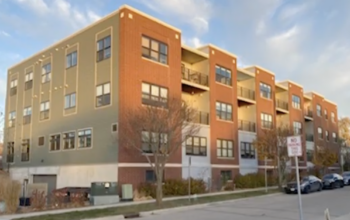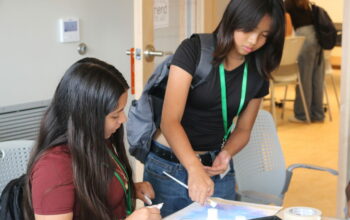For lifelong sailor Dave Elsmo, knowing the weather is everything, but in recent years, the weather has become more unpredictable, and that’s a problem for his job.
Elsmo, the director of programs at Outdoor UW, plans the Winter Carnival at Memorial Union, an event filled with on-ice activities dating back, in various forms, to at least 1916. In 2023, the union had around 28,000 visitors on that day, but in 2024, the ice was unstable.
Last winter, Lake Mendota and Lake Monona only had 44 days of lake freeze days—days when the lakes were fully frozen over—the second shortest lake freeze period since the winter of 2001-02, when the lakes were frozen over for only 21 days. Many winter activities like the Winter Carnival were either canceled or modified to not include any on-ice activities. This year, the City of Madison almost decided to stop funding its outdoor rinks.
Climate change has led to more extreme weather patterns in recent years. Warmer-than-normal winters made it harder for Madison residents to enjoy cold weather activities. Organizers are making alternative plans for events this winter, expecting the lack of cold weather may disrupt plans again. However, this uncertainty doesn’t mean Madisonians will miss opportunities for the usual winter fun.
In Wisconsin, the trend of fewer lake freeze days and higher average temperature has been going since 1971, said Edward J. Hopkins, the assistant Wisconsin state climatologist at the State Climatology Office. He’s been keeping the ice cover records for three Madison lakes, a dataset that dates back to the mid-19th century.
“You have 10 years of really warm winters and you start to think that that’s normal, but when you have data going back hundreds of years you can start to see the pattern,” said Sarah Skwirut, the marketing and PR manager of the Clean Lakes Alliance, a nonprofit dedicated to improve and protect the water of Madison lakes.
Last year, the alliance’s annual Frozen Assets Festival also canceled all its on-ice activities due to unstable ice, including its race across the frozen Lake Mendota.
This year, it has already set up a backup route on land, Skwirut said.
It’s not just festivals that feel the impact. The unpredictability of winter weather almost prompted a funding cut in the City of Madison’s 2025 executive operating budget that would have eliminated ice rinks from the city’s public parks, but a $22 million referendum passed on Nov. 5 preserved funding for the rinks.
However, maintaining ice rinks has been difficult. “We struggle to really get a good stretch of ice open and maintain it open for a long period,” said Chad Hughes, parks operations manager of the Madison Parks division.
In an effort to combat unpredictable weather, some parks in Madison have adopted “NiceRink,” a swimming-pool-like ice rink that freezes faster than natural lagoon rinks. The parks division has also considered installing cooling coils like the ones at the Edgewater Hotel to artificially freeze the ice, but that would require a lot of resources when they have to maintain their priority of removing snow from bike paths, parking lots, bus stops and sidewalks, Hughes said.
To accommodate climate change, Hopkins recommends that winter recreation organizers have alternative plans for their activities.
Outdoor UW is working to diversify its activities for the Winter Carnival, having backup plans and more non-ice activities. However, they still plan many on-ice activities, and without a reliable long-term forecast, things can still change a week before the event, Elsmo said.
“Being able to think on the fly and program smart alternatives, that’s the game every day,” Elsmo said.
If winter conditions don’t get better, Elsmo said the Wisconsin Union might have to move the winter carnival to a different season.
“If one day in February it’s 60 degrees and we’re having a frozen assets festival, hopefully we can remind people that it used to be a frozen lake,” Skwirut said.
“Hopefully we don’t get to that point. Hopefully we can start, as a society, start taking climate change more seriously.”
Hopkins said that we are not even a quarter of the way through the 21st-century.
“So, you know, things could change, hopefully back to the other direction,” he said.
Weather watchers are still trying to predict what Madison-area residents will experience this year. As of Oct. 17, the National Oceanic and Atmospheric Administration’s U.S. Winter Outlook predicts below-average temperatures for the north and above-average temperatures for the south, while Wisconsin stands an equal chance to either way.
Elsmo said Outdoor UW has just begun planning next year’s winter carnival, navigating the unpredictability of weather. “We’re hoping for good ice and snow so we can have a good winter of programming,” Elsmo said. “I think it’s gonna be an awesome year, but there will always be something, that’s why it’s a job.”






